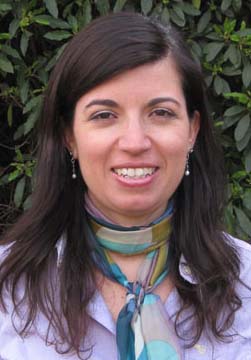- ON THE DECADE
- THE DECADE'S CAMPAIGN
- REPORTING ON PROGRESS
- THE DECADE'S PROGRAMMES
- FOCUS AREAS
-
- Access to sanitation
- Financing water
- Gender and water
- Human right to water
- Integrated Water Resources Management
- Transboundary waters
- Water and cities
- Water and energy
- Water and food security
- Water and sustainable development
- Water and the green economy
- Water cooperation
- Water quality
- Water scarcity
- FOCUS REGIONS
- RESOURCES FOR
- UN e-RESOURCES
International UN-Water Conference. Water in the Green Economy in Practice: Towards Rio+20. 3-5 October 2011
The Green Economy and... Caridad Canales
 "We should rethink the future we want, and one without water cannot be envisaged."
"We should rethink the future we want, and one without water cannot be envisaged."
Caridad Canales
Economic Affairs Officer, Economic Commission for Latin America and the Caribbean (ECLAC)
What does the green economy mean to you?
For me, it means really thinking about the future generation. Personally, I think the green economy is a new opportunity to achieve development in a way that is inclusive and environmentally sustainable. The financial crisis we are facing today gives us space to think about ways to eradicate poverty and manage our resources better. I hope the green economy concept doesn't only remain in the textbooks. We need to make real transitions on the ground. The challenges we are facing are serious and we cannot allow ourselves to miss this chance that we have now.
Why is 'water in the green economy' an important theme for ECLAC?
First of all, water improves the quality of people's lives in every way. In a region like Latin America, where there are still 40 million people without access to water and 180 million people living in poverty, water is crucial. Providing water and sanitation in a sustainable and equitable way can contribute to economic growth and reducing poverty. Improving efficiency and getting the right economic tools can set a framework that helps the countries in the region to transition to a green economy. ECLAC is looking back on the achievements and missed opportunities since the Conference in Rio in 1992 and is working to find out how Latin America and the Caribbean can truly make the transition to a green economy.
At the moment of this interview, ECLAC is involved in one of the regional preparatory meetings for the Rio+20 conference. The fact that the Rio conference will take place within our region makes the conference even more special for us. The Latin American and Caribbean countries are becoming very active in the preparatory conferences; for example we had more than 150 NGOs participating in the preparatory meeting being held in Santiago!
What needs to be changed in Latin America to realize a green economy?
For me, the two most important things are good governance and political will. Even very good policies do not work without these two elements. 10-20 years ago, water was really high on the political agenda, but now it has been snowed under by other issues, such as the financial crisis. Strengthening the institutional frameworks -not only in the water sector, but in general- and moving water back on the political agenda are challenges that the governments in the region need to overcome. To achieve this, we should generate regional consensus. Even though the region has great inequalities, economic development will continue to augment. Setting clear rules - good governance- for allocating resources can enable countries to grow in an equitable way without hampering their sustainability.
What will you highlight in the ECLAC session?
In our session we will talk about water charging and promoting financial sustainability through water prices. In the LAC region these tools can have significant relevance for generating resources; the water sector cannot always depend on budgets or foreign investment. They can help internalize environmental costs and promote a more efficient use of water among users.
A unique case in the region is Chile. In 1970 Chile set the goal to move from charging fees that didn't covered the full costs towards achieving financial sustainability. To realize this goal, a series of gradual reforms and changes was implemented. In the 80's the water tariffs were increased. At the same time, the quality of the water service was improved. As a result of the implemented policies, water prices are now financially sustainable and the efficiency of water use increased.
Several factors contributed to its success; the economy was growing with 7%; the increase of tariffs was gradual; communication campaigns were set up to teach people how to save water; and there was an efficient scheme of subsidies that helped poor people to pay their bills. The main lesson from this case is that coordinated policies with a long term perspective can enable the right conditions to set tariffs that reflect the full cost of water.
Peru is another case study that will be showcased in our session. The water regulator, SUNASS, is developing and implementing a new paradigm for sustainable regulation; integrating environmental and economic tools to improve water governance and to consider environmental costs when assessing investment options, for example.
Economic and social inequalities between rich and poor population groups are still persistent in the LAC region. How can we make sure that the transition towards a green economy is inclusive?
That is the biggest challenge. We need to aim to fight against these inequalities. I believe that the green economy is the right way forward. The people that are most vulnerable are the people that suffer the most from inefficiencies in the system. We need to make sure that we think about the effects that new policies have on our society. When we implement new policies and programmes, we have to accurately assess the financial, social and environmental costs. A holistic approach is essential if we want to realize an inclusive green economy. Economic growth needs to be coupled with prosperity, ensuring that we maintain the natural systems that support life on earth. Only then we can bring change in an inclusive way.
What message would you like to deliver for the Rio+20 conference?
I think the main message that echoes across the LAC region is that we need to strive for economic growth that is inclusive and that the green economy can help us in this. Personally, my message is that we have to renew our commitment towards meeting the Millennium Development Goals, especially the one that aims to increase access to water. Water is one of the building blocks of the green economy and needs to play a central role in delivering social benefits
What are your expectations for the conference in Zaragoza and what would you like to learn?
The Zaragoza conference is an excellent opportunity to exchange information; to learn from what is working in other regions of the world; and to consolidate a very strong message towards Rio+20. The water sector needs to be invigorated and I am sure that the Zaragoza conference allows experts, policy makers, scientists and others to explore issues that otherwise would be difficult to discuss. I hope that the conference participants will come up with a clear set of tools for best practices that can be adopted in the Latin American context. It is complicated to replicate experiences, but I am looking forward to understanding the dynamics that really underpin the green economy.
>> Conference Home
>> Statements from UN Agencies
>> Video recording of sessions

>> Ch1 Water on the Road to Rio+20
>> Ch2 Challenges and opportunities for water in the transition to a GE
>> Ch3 Thematic conference papers
>> Ch4 Conference summary: Water in the GE in practice
>> Ch5 The way forward
>> A1 Water toolbox: A contribution to Rio+20
>> A2 Feedback report
>> A3 Communications report
>> Case papers by tool
>> By region 
>> Developing countries 
>> Developed countries 
>> Agenda 
>> Economic instruments
>> Green jobs
>> Sustainable financing
>> Investments for biodiversity protection
>> Water technology
>> Water planning
>> ESCWA region
>> LAC region
>> Conference daily
>> Interviews with case presenters 
>> Presentations
>> Communications articles
>> Conference media brief 
>> Daily press notes
>> Interviews with session conveners
>> Issues information briefs
>> Tools information briefs
>> Banners
>> Reader on water and the Green Economy 
>> Conference poster 
 >> Discussion forum
>> Discussion forum
 >> Twitter
>> Twitter
>> Water, energy and food security
>> Spanish Business Dialogue
>> Stakeholder dialogue on the Green Economy in Spain
>> Technical visit
>> Organizers
>> Participants
>> Conference committee
>> Rationale
>> Tools
>> Expected outcomes
>> 2nd UNCSD PrepCom
>> Road map to Rio+20
>> Key questions on GE
Copyright | Terms of use | Privacy notice | Site Index | Fraud alert | Help





